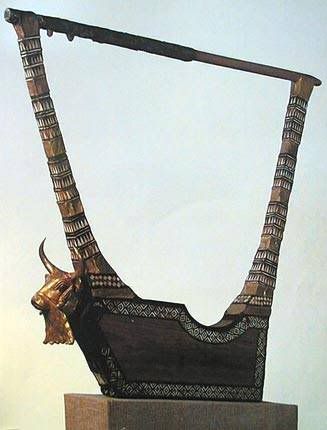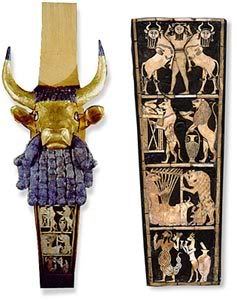In Trust Entrusted
With the mayhem that ensued upon the 2003 invasion of Iraq by the "Coalition of the Willing" led by the United States intent on removing Saddam Hussein from power, many events that were not anticipated occurred that represented regrettable oversights. Not the most egregious was the looting of the country's museums of its vast heritage of archaeological treasures, but for a country priding its heritage, a blow to its self-esteem.Iraq's fabled past is one that certainly no country would wish to divest itself of, and the treasures that it had stored in its museums and cultural institutions represented the country's previous existence as a historical, architectural, artistic, social and religious geography within a greater landmass of biblical-era existence.
Mesopotamia , Egypt, the Sinai desert, the Israelites. Landmark representations like the Hanging Gardens of Babylon dedicated to the beloved wife of Nebuchadnezzar. The King of Babylon in 587 B.C.A. destroyed Jerusalem, and that in and of itself is a noteworthy historical event of great consequence, even to the present day, as Jews were dispersed and left in sorrow:
"By the rivers of Babylon, there we sat down, yea, we wept, when we remembered Zion." "If I forget thee, O Jerusalem, let my right hand forget her cunning. If I do not remember thee, let my tongue cleave to the roof of my mouth; if I prefer not Jerusalem above my chief joy."The world has ample evidence that the Israelites, dispersed, derided, denounced, despised and destitute in a world unwilling to host the people shut out of their historical and beloved homeland, would not forget their heritage, though millennia had passed. World-wide Jewry, of whom there are fewer than might have been, had not the greatest concerted attempt at obliteration not occurred thousands of years later, still mourn, still cleave to Jerusalem.
Modern Iraq, despite its past of continued totalitarian rule, with the people riven by violence not the least of which arises out of antipathy toward one another's versions of Islam resulting in sectarian bloodshed, still has every reason to treasure its heritage. Looted treasure has been returned to the country through agreements with foreign countries where the archaeological gems have turned up: the United States, Germany, Syria, Turkey.
Those countries have willingly signed up to the responsible retrieval and return of the vestiges of a past civilization in a country that had reverted to savagery in its bloody attacks upon itself. "Iraq cannot be summarized by 30 years of problems and wars - it can stand and it can reclaim its history", Iraq's ambassador to Washington proclaimed, as he took possession of the returned artifacts on behalf of the country.
"This is a very happy day - we are making progress in the very important field of returning Iraqi history to its rightful home", explained Samir Sumaidaie. A shipment of 540 returning priceless archaeological objects is the second to wend its way back from international posts to the country of origin. There was a previous shipment of 632 pieces that had been returned.
That shipment had been trustingly delivered to Prime Minister Nouri al-Maliki's office. And it is nowhere to be found now. Most peculiar by anyone's estimation.
The Iraq museum, looted of its fabulous treasures, its officials lamenting the irreplaceable loss. Its historical artefacts simply vanished. "This goes back to the most sensitive nerve in the Iraqi psyche", explained the country's Foreign Minister. "These are antiquities that have been stolen from the museum and now to get them back is a healing process - that we, your sons, the government, the embassies, the ministries are able to bring them back is very, very important."
Indeed. "We asked the U.S. military to move it to Iraq. When the pieces arrived in Iraq, they were delivered to the office of the prime minister and now we are trying to find them", Iraq's Washington ambassador has declared. The items were signed for at the office of the prime minister; that much has been ascertained. Where they are now, however, is a problem that confronts the Museum's authorities.
And the Prime Minister of Iraq, Mr. Al-Maliki, has not, nor has his office ostensibly, made any effort to clear up the mystery of the lost-and-found and now lost-again articles of greatly momentous heritage. Pilfering of national treasures for private gain? Howling in indignation and righteous anger that the nation's historical patrimony was looted by invading foreigners and now, in the possession of the government itself, nowhere to be found?
How utterly - well - peculiar?


Labels: Middle East, Political Realities, Traditions


<< Home